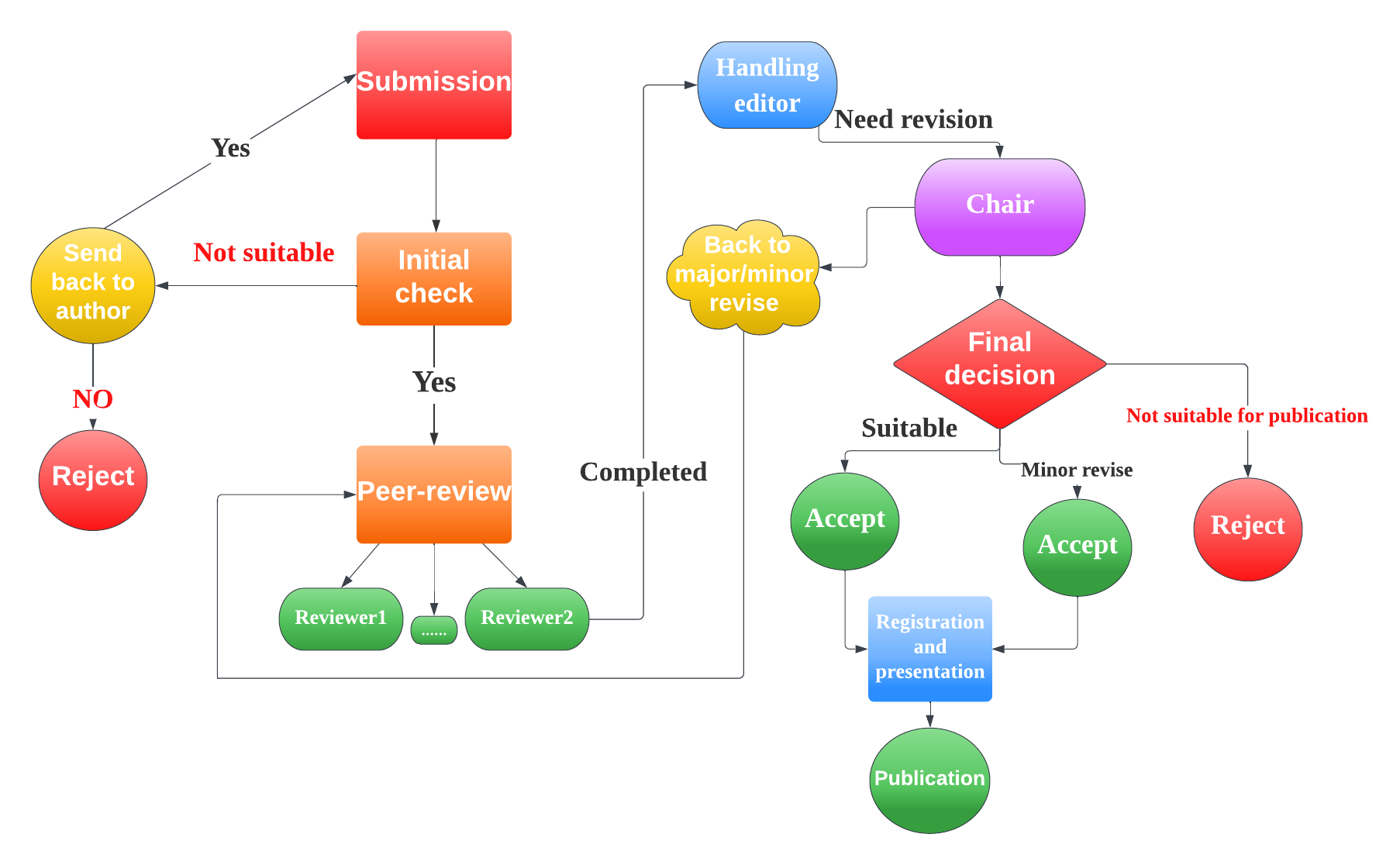Peer review is a vital step in the publication process where experts in relevant research fields evaluate submitted manuscripts.
The research papers should be peer-reviewed by two to three expert reviewers before acceptance. And the revised papers should go through the second peer-reviewing if it is necessary. The outcome of peer review helps authors improve the quality of their papers by giving them constructive feedback and, importantly, allows the editor to assess whether a submission is suitable for publication.
The editorial process of a paper consists of two parts: Initial Check and Peer Review. Note that only full papers that passed Initial Check will be subject to Peer Review.
Paper passing initial check will be assigned to two to three reviewers in the relevant field for peer review. Reviewers are expected to carefully review the submitted manuscript and complete a detailed review report that helps the author to improve the quality of their papers. Authors may be asked to revise their papers according to suggestions given by peer reviewers. Based on recommendations from the reviewers, the editor will make the ultimate decision on whether the paper is accepted or rejected.
Initial Check
The editorial office performs an initial check of the paper regarding issues such as plagiarism, self-plagiarism, research scope, composition, structure, format, length, basic presentation quality, etc. Feedback on the Initial Check is usually available in 2-3 business days.
Double Blind Peer-Review
To enforce the double-blind review policy, the author’s names, affiliations, acknowledgments, and other related personal information will not be disclosed to the reviewers. Each paper is reviewed by at least two, but usually more than three reviewers. Each review will be assigned at most five papers and given 2-3 weeks to review one paper. Peer- reviewers are expected to assess the validity, quality, and originality of the submission.
Criteria
Papers accepted for the conference will be accepted for inclusion in the proceedings and published by a co-publisher. Although publishers may have slightly different criteria for publishing ability, ATEEE has implemented widely accepted sets of standards for paper selection and publication to ensure high technical quality and ethical standards.
Relevance
The paper presenting the author's research should be within the scope of the conference. Before submitting a paper, please check the topics of interest for this conference. If you doubt the suitability of your paper for this conference, please send us an inquiry email.
Scientific Significance
With the publication of the conference proceedings, your work will also be presented to the scientific community. Therefore, authors should ensure that the results are objective, reliable, valid, and reproducible and that the research presented in the paper is worth reading, publishing, and sharing from the perspective of the editors and reviewers.
Scientific Rigor
Authors have a responsibility to conduct their research with scientific rigor and to implement the highest standards in their research, from topic selection to data analysis. Sufficient detail needs to be provided for reviewers to evaluate their work and for other experts to replicate the study.
Quality of presentation
The data, analysis, and results of your research should be presented appropriately. High-quality presentation makes your results easier to understand and removes barriers to the peer review process.
Decisions and revisions
During the peer review process, authors will receive the following four possible types of feedback.
Acceptance
The paper is accepted without any revisions.
Accepted with minor revisions
The paper will be accepted with minor revisions. In this case, the reviewed paper will be reviewed by the editor only.
Reassessment with major revisions
The paper will be sent to the original reviewer for review (unless they opt out) or evaluated by the editor.
Rejection
The paper will not be accepted due to significant deficiencies and resubmission is not recommended.
Note: Authors have the right to submit rebuttals or to question the editor's comments.
